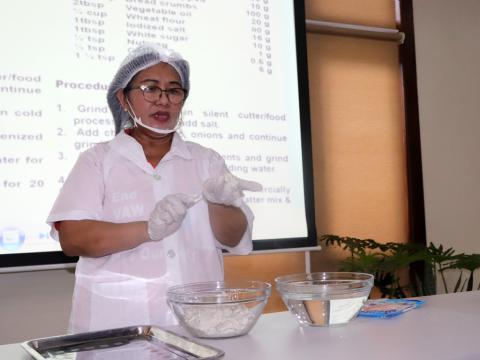BFAR aquaculturist Corazon Dela Cruz leads the demonstration of processes in making tilapia-based products such as burger patty, fish balls, and nuggets. (photo by Daniel Nilo)
DILIMAN, Quezon City—To impart proper and sustainable ways of fish farming and boost its industry, the Agricultural Training Institute (ATI) led a free seminar on fish production and processing.
In this event, the potentials of tilapia farming were discussed. Known as the “aquatic chicken” because of its high protein content and lower market price, tilapia has become the second widely cultivated fish species in the country.
To provide knowledge on aspects of its production and profitability, Manuel Dimalaluan, of the ATI-Partnerships and Accreditation Division (PAD), discussed sustainable management practices in tilapia farming. Using a technology video from the Bureau of Fisheries and Aquatic Resources (BFAR), Dimalaluan explained the two types of tilapia farming, namely, the fish pond and the fish cage cultures.
He also discussed the difference between these tilapia cultures from site selection, feeding, management, and maintenance to the harvesting process. On its profitability, Dimalaluan shared that fish cage culture can bring 124% return on investment in one year, while the fish pond culture can reach 133%.
Due to tilapia's high potential in the world market, the government has put up support infrastructures such as the tilapia fillet processing center in Northern Mindanao. Technologies in tilapia farming and processing are also being taught in BFAR regional fishermen training centers and regional offices across the country.
Likewise, training is open to those who want to learn tilapia technology and start a business. All these initiatives aim to ensure food security, create more jobs, and add to the country’s revenue in local and export markets.
Aside from the production potentials, BFAR aquaculturist Corazon Dela Cruz discussed processing of tilapia into profitable food products through a hands-on demonstration on making tilapia burger patty, fish balls, and nuggets.
“I learned a lot of information about growing tilapia. I hope that ATI will continue to offer seminars like this for us to learn various technologies in agriculture and fisheries,” Salvador Sarting of Caloocan City said as he expressed appreciation for the presentations given.
The one-day event, spearheaded by ATI-PAD, took place last September 27, 2019 at the ATI Rural Development and Education Center.
Students and aquaculture enthusiasts from Metro Manila and nearby provinces were most of the attendees. They also received free information, education, and communication materials on fish culture and processing.

